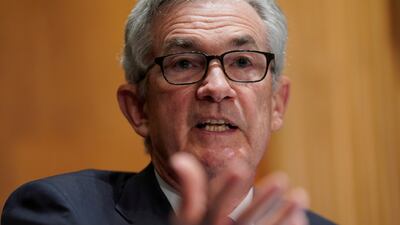US Federal Reserve Chairman Jerome Powell on Friday signalled it would be appropriate to begin tapering the Fed's bond purchases by the end of the year if the economy shows further progress, but stopped short of providing an exact timeframe.
Mr Powell, speaking virtually at the Jackson Hole conference, said inflation met its test of “substantial further progress” towards the Fed's goal of 2 per cent annual inflation over time, which was necessary to begin the tapering process.
He stressed that it does not signal any plan to start raising the Fed’s benchmark short-term rate, which it has kept near zero since the start of the pandemic.
Mr Powell had not been expected to make waves in his remarks at the two-day Fed symposium, where investors were keen to see how the Fed will approach US interest rates amid the coronavirus pandemic, now exacerbated by the Delta variant.
Before the conference, the Fed had already indicated it may begin tapering before the end of the year.
The Fed has been pouring $120 billion monthly through its bond-purchasing programme since the onset of the pandemic, helping keep long-term policy rates low.
Some market-watchers expected the conference would be an opportunity for Mr Powell to hint about tapering this practice amid rising commercial prices and signs of inflation.
New GDP figures issued on Thursday showed the US economy grew slightly faster than had been estimated, at 6.6 per cent.
Jobless claims rose on Thursday for the first time in a month, climbing to 353,000 following a pandemic low of 349,000 a week earlier. Despite this increase, economists expect unemployment claims to continue declining.
“We expect jobless claims to remain on a downward path as the labour market continues to recover, but progress will be more fitful as claims get closer to pre-pandemic levels,” economists Nancy Vanden Houten and Gregory Daco of Oxford Economics wrote in a report.
The nation's unemployment rating fell to 5.4 per cent in July, with 943,000 jobs created.
But the highly transmissible Delta variant and a resurgence of Covid-19 cases have clouded the economic outlook — also forcing the conference, typically held in Jackson Hole, Wyoming, to go virtual.
Mr Powell addressed the rise of the Delta variant on Friday.
“While the Delta variant presents a near-term risk, the prospects are good for continued progress towards maximum employment,” he said.
Dallas Federal Reserve President Robert Kaplan, one of the US central bank's biggest supporters of reducing support for the US economy, acknowledged the variant's effect on economic growth could force him to adjust his views.
“US consumers bought fewer goods in July than they did in June while consumer sentiment in August fell to its lowest level since the start of the pandemic last year,” said Khatija Haque, the chief economist and head of research at Emirates NBD.
Calling off the tapering may not be the base case scenario, suggests Ipek Ozkardeskaya, a senior analyst for Swissquote. Instead, the base case scenario would be for Mr Powell to cautiously stick to the plan.
By sticking to its tapering plan, the Fed could trigger a profit across the major US indices in the coming sessions.

